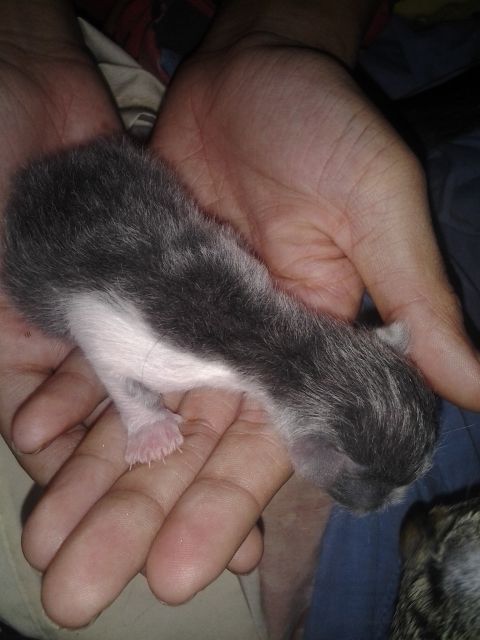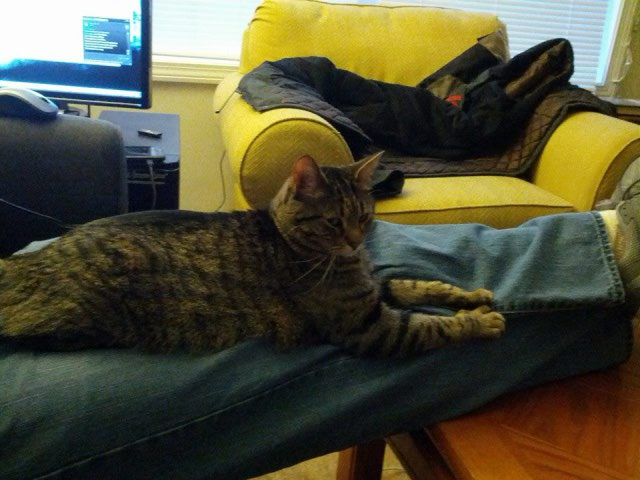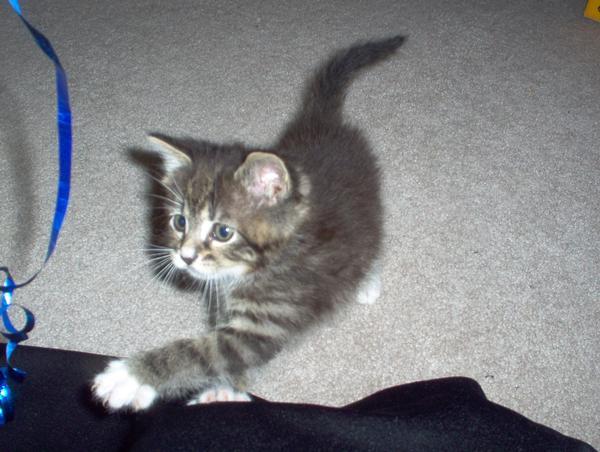Question what kind of house hold products can you use for giving your kitten a bath..?
AnswerJessie,
Bathing young kittens and cats in general isn't something that I routinely recommend. My resident cats are only bathed once or twice a year to help reduce the potential for excessive hair balls due to increased shedding at specific times of year If a cat/kitten has managed to get something dangerous/toxic onto their coats they should be immediately taken to the vet with the packaging for the substance if at all possible to ensure proper treatment. In some cases the treatment goes beyond bathing a cat/kitten that has come into contact with a poisonous or dangerous substance, it's also important to realize that the type of substance that your feline friend has on their coat will dictate what an appropriate product is to bathe them if this is the course of action recommended by your vet. Cats & kittens that aren't bathed in a warm environment, kept warm until they are mostly dry and watched carefully can sometimes become mildly hypothermic.
Cats of different ages will often need different products. I generally suggest that you try to use a mild, soap free shampoo meant for kittens. A company called Earthbath makes a great line of products for bathing and conditioning the coats of cats. You can check out their website at www.earthbath.com or email the company for further information at info@earthbath.com. The milder the product that you use to bathe your cat/kitten the less potential there will be for uncomfortable irritations to develop. If you can get away with using wipes formulated to clean and deodorize your kitten's coat this would be a better alternative than bathing him/her. Ultimately my recommendation to you is to choose the least invasive way to clean your kitten's coat.
If your kitten is stinky because he/she has gotten into something or she has had a bout of vomiting or diarrhea that has soiled her coat your kitten should see a vet promptly as these symptoms usually indicate illness. Many cat shampoos aren't appropriate for kittens under 6-8 weeks of age. If your kitten has fleas or other external parasites then I would recommend that you take them to the vet to be treated with prescription anti-parasitic medicines as these drugs are generally more effective than a bath. When bathing your kitten any external parasites move away from the shampoos and they can often end up in eyes, ears and nostrils. The short answer to your question is that I normally don't recommend household products such as baby shampoo or dish soap for bathing cats or kittens without a vet's recommendation as these products can sometimes be harmful and cause unpleasant allergic reactions, itching or dryness. Ultimately the reason that you want to give your kitten a bath and how old this little one is makes a difference in my recommendations as far as products go. The main thing is that the kitty shampoo be as mild as possible to decrease the potential for skin irritations to develop. If your kitten isn't grooming him/herself properly there can be a number of reasons for this. It is out of character for most healthy cats to allow their coat to become greasy and smelly because cats/kittens are naturally very clean.
There are a number of techniques to help make bathing a cat or kitten a much safer, gentler process. My recommendation is that your vet make the determination whether or not your kitten needs a bath in the first place. Assuming that a bath is necessary I would recommend that you do things that will help your little one to become more comfortable with the bath and reduce the risk of serious consequences related to the kitten becoming too cold. You will need a shampoo formulated specifically for kittens, a couple of thick, fluffy towels, a heating pad plugged in and set on low, a hand towel, a plastic container to help make rinsing the shampoo out of your kitten's coat, a warm room, a fair amount of time (about 2 hours or slightly longer) and patience. Bathing a cat or kitten isn't something that you can rush through, your feline friend will need encouragement, comforting and a calm, patient approach. I would highly recommend that you try to have someone available to help you with this in order to make things easier on you and your kitten. It's not a bad idea to entirely avoid getting water or soap into your kitten's eyes and ears. Your kitten's face can be washed with a commercially available bath wipe if necessary which means that your bath will cover the area between this kitten's neck and tail. The first thing that you will want to do is to make sure that your kitchen counter is free of objects in general. Then you will clean the sink thoroughly using dish soap and rinsing it well. Your kitten's bath water should be comfortably warm when you place the inside of your wrist in the sink. I would recommend that you place the hand towel in the bottom of the sink to help your kitten feel as though they have something to hold onto other than her human.
Before starting your kitten's bath I would suggest that you fill your plastic container with water the same temperature as his bath water and set it aside. You will then want to make sure that your kitten's shampoo is open and ready to go. Before you go and get the kitten I would suggest that you plug your heating pad in, turn it on medium and place it between your two towels to warm them up. Once your towels feel pleasantly warm you will want to reset the heating pad to the lowest setting. It is extremely important that you speak to your cat/kitten in a soft, soothing tone while bathing them so that they are as calm as possible throughout the process. There is a chance that you will be bitten or scratched during a kitty bath, this is dependant on the cat's personality and temperament and the level of fear that they are experiencing. Bathing a cat/kitten must be done gently, calmly and as quietly as possible. You should try to get bath time over for your kitten as gently and quickly as possible to avoid causing unnecessary stress. When placing your kitten into the sink for her bath I would recommend that you take the time to talk to her, reassure her and don't try to force her into the water. My cats prefer to only have their hind paws on the towel in the sink while I hold their front paws firmly, but gently in one hand. You can use the container of water to gently wet your kitten down, but you must be careful to avoid getting water into her eyes, nose or ears as this can be uncomfortable for your kitten and could potentially result in eye irritation or a painful ear infection. It is important to use the smallest amount of shampoo possible because the more you use the less likely you will be to get it all out which can create significantly uncomfortable skin for your kitten. I generally work from the scruff of a cat's neck towards their tail. It isn't a bad idea to wash the little one's belly and bottom. Your next step will be to rinse the shampoo out of your kitten's coat. You can opt to have a second person help with this as you can shorten the amount of time your kitten is wet which is important. It is difficult to get all of the soap out of a cat's fur so rinsing until you think that all of the soap is gone isn't quite enough. Once you feel that your kitten is soap free I would recommend that you drain the sink and rinse her several more times anywhere that you have applied shampoo. You or your helper will then need to take one of the warmed towels and get as much water out of your little one's coat as possible. Your first towel will generally not be very useful to dry your kitty simply because there is a substantial amount of water left in the towel. You will then want to wrap your kitten up in the second pre-warmed towel and place the heating pad on the outside of the towel in order to help your kitten stay as comfortable as possible. Once your kitten seems fairly warm then you can unwrap the towel and check to see if she is dry. I wouldn't recommend that you bathe your kitten in a house/apartment with an air conditioner running as this can potentially cause your kitten to become too cold quite quickly. I would highly suggest that you try to avoid bathing this kitten if at all possible as most cats tend to find the experience quite stressful.
Having your kitten examined by a qualified vet is routine for kittens to ensure that the little one is healthy and happy in every way as well as getting started on routine preventative health care including deworming, treatments for fleas, ticks, mites or lice and a general assessment of your kitten's overall condition. Establishing a relationship with a vet that you are comfortable with is an important start to keeping your kitten healthy throughout her lifetime. I hope that you have found this information helpful. If you have any further questions, concerns, or you would simply like to send an update or some pictures my way, please don't hesitate to contact me again.

 Trouble with my Two female cats.
Question
The kitten Two Cats
Hello, I have
Trouble with my Two female cats.
Question
The kitten Two Cats
Hello, I have
 Cats not feeling well/sneezing a lot
QuestionFurry Children
QUESTION: I have 3 fixed
Cats not feeling well/sneezing a lot
QuestionFurry Children
QUESTION: I have 3 fixed
 shots/food
QuestionQUESTION: Teresa,
Silver is a wild kitten we he
shots/food
QuestionQUESTION: Teresa,
Silver is a wild kitten we he
 Chinese Li Hua?
Question
Magnus1
Hi,
My husband and I recently
Chinese Li Hua?
Question
Magnus1
Hi,
My husband and I recently
 runts
Question
stubby(my cat)
Can the mother chew off
runts
Question
stubby(my cat)
Can the mother chew off